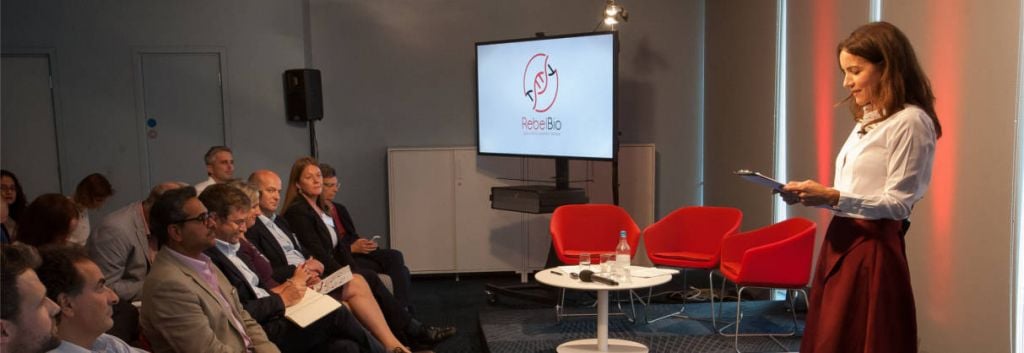Newsletter Signup - Under Article / In Page
"*" indicates required fields
The RebelBio startups of 2017 reach a major milestone as 15 young companies came forward to explain their ideas, science and how they are selling them.
A mere 3 months after the 15 chosen projects for the RebelBio accelerator went off to the labs to refine their prototypes, Demo Day arrived last week on July 26th for them to show the world what they had been up to. While last year’s Demo Day took place in Gaol, Ireland, this time the freshly-rebranded RebelBio went to the famous I-HUB of the Imperial College London.
Besides the live audience at the sold out event, the companies also pitched to the several thousands of livestream viewers. Forgot to watch it? No worries: it has all been recorded. Here, we take a look at the participants and their achievements.
The brainchild of Chilean bioentrepeneur Emilia Díaz, Kaitek Labs is developing a proprietary detection kit shellfish toxin, based on an engineered bacterial biosensor that changes color when exposed to a toxic sample. The company has already started to sell the first kits for research, and the discussion focuses on the potential human impact of the innovation.
Next up on stage was Thomas Meany, the co-founder and CEO of Cell-Free Technology, which aims to make a cheap kit for rapid prototyping of drugs, scents, flavorings and dyes. How? By bypassing the cells and biohazard regulations. Their first product was so popular that it was 4 times oversubscribed.
Rachel Major explained how NuLeaf Tech is aiming to bottle the genius of nature to make a cheap, small unit for wastewater treatment. The project received several accolades in the US, interested clients have lined up, and the company has sold its first system. Now, the objective to create a more advanced system that can be scaled up.
Valanx BioTech has a patented method to create targeted cancer drugs with protein conjugates. CEO Michael Lukesch explains how the technology can superpower biologic drugs and make cancer treatment less of a side-effect nightmare. They have already produced the cheapest protein conjugates today.
Khonsu Therapeutics, led by Emer O’Shea, is investigating a protein produced during pregnancy to tackle autoimmune diseases, which have a big human impact and are a big pharmaceutical target. The business plan aims to start with a veterinary product that can advance their program and fuel their human trials at the same time.
Bonn Macy, from Phyteau Functionals, explains how his startup aims to tackle another of great health concerns: metabolic diseases, including diabetes. His team studied a specific disease mechanism and tested the effect of plant compounds. Now, they have a candidate that could be more effective, cheaper, and reach the market a lot quicker than a developed drug.
Galactica Biotech uses its proprietary artificial intelligence method to detect potential beneficial side effects of drugs that were already invented, thus finding other purposes for therapies on the market. Jorge Valencia explains the startup’s business model and their achievements with two molecules.
Chidananda Kanchiswamy is the CEO and co-founder of PLANTeDIT, which developed a plant genome editing platform with CRISPR to make designer foods that don’t carry a GMO tag. Their first project is a soy plant with an oil composition similar to olive oil.
Mary Ward pitches her company, SexPositive, which wants to democratize the diagnostic of sexually transmitted diseases and is aiming for the cultural impact off-the-shelf pregnancy tests had 30 years ago. They have already developed a prototype, tested the social media waters and have the market released planned for 2019.
Nils Rehmann kick-started his pitch with an example of an indication which can be helped by cannabinoids. His company, Canuevo Biotech, has proprietary drug delivery technology to help transform cannabis into a standardized pharmaceutical product. Their first product is a cosmetic skin care product, which will be later developed as a potential treatment for psoriasis.
CyCa OncoSolutions developed a molecular machine to deliver cargo into the cell, which can be programmed to deliver anticancer drugs to specific targets. Nusrat Jahan shares her motivations to make cancer treatments more bearable to patients and start animal studies with a generic cancer drug next year.
Enrico Di’ Oto was inspired to create the technology behind OaCP by cancer patients he tested with genetic diagnostics. OaCP offers patented reagents that can work in standard equipment and reduces the results wait time from days to hours.
Myrka Roya Zeleden is the CEO of Hemoalgae, which aims to produce better anticoagulants. Hemoalgae’s team took genes of leeches and are expressing them in algae, and plan to start co-developing a clinical product by 2019.
SwaLife Biotech is synthesizing plant molecules that protect DNA from sunlight damage, creating skin care products that can be used as sunscreen without blocking vitamin D production. Pravin Badhe, CEO, walks us through the startup’s recent advances, including a collaboration with Leo Pharma.
Anna Ramata-Stunda introduces Alternative Plants, a startup that wants to make rare cosmetic ingredients from plant stem cell factories. At RebelBio accelerator, they have increased yields, reduced costs and are closer to their $2.6Bn market.
All in all, it looks like a great class of biotech innovators! We are really looking forward to the participant’s future companies and their products.
Images by Dave Milnes
Partnering 2030: FME Industries Report







